
Critical Care and Resuscitation
Scope & Guideline
Elevating patient outcomes through cutting-edge research.
Introduction
Aims and Scopes
- Critical Care Practices:
The journal extensively covers clinical practices in critical care, focusing on the management of critically ill patients in intensive care units (ICUs). This includes studies on various interventions, monitoring techniques, and treatment protocols. - Resuscitation Techniques:
Research on resuscitation methods, including advanced life support and extracorporeal membrane oxygenation (ECMO), is a core area. The journal publishes studies that evaluate the efficacy and safety of these techniques in emergency settings. - Patient Outcomes and Quality of Care:
A significant emphasis is placed on patient outcomes post-ICU admission, including long-term survival, quality of life, and psychosocial aspects of recovery. This area highlights the importance of patient-centered care in critical settings. - Innovative Methodologies:
The journal promotes innovative research methodologies, including randomized controlled trials, observational studies, and systematic reviews, particularly those that introduce novel approaches to critical care challenges. - Multidisciplinary Approaches:
Recognizing the complexity of critical care, the journal encourages a multidisciplinary approach, integrating insights from various fields such as nursing, pharmacology, and psychology to improve patient care in ICUs.
Trending and Emerging
- Technology Integration in Critical Care:
There is an increasing focus on the use of technology, such as artificial intelligence and machine learning, to enhance patient monitoring and decision-making in ICUs. This trend highlights the potential for technology to improve outcomes and streamline care. - Patient-Centered Care and Quality of Life:
Research on the long-term outcomes and quality of life for ICU survivors is becoming more prominent. This shift indicates an increasing recognition of the importance of holistic care that extends beyond immediate medical treatment. - Emerging Infections and Resilience in Critical Care:
The impact of emerging infections, such as COVID-19, has led to a surge in studies addressing critical care strategies for infectious diseases. This theme reflects the need for resilience in critical care systems to manage future pandemics. - Multidisciplinary and Collaborative Research:
There is a growing emphasis on collaborative research that involves multiple disciplines, reinforcing the importance of teamwork in improving patient outcomes in complex critical care scenarios. - Sustainability and Resource Management in ICUs:
Emerging research on environmental sustainability and efficient resource management within intensive care settings is gaining attention. This reflects a broader trend in healthcare towards reducing waste and improving the sustainability of practices.
Declining or Waning
- Traditional Pharmacological Interventions:
Research related to conventional drug therapies, especially those with established efficacy, has waned as new, innovative treatment modalities gain attention. This shift indicates a growing interest in exploring alternative therapies and personalized medicine. - Basic Clinical Practices:
Studies focusing on routine clinical practices that do not significantly alter patient outcomes are less frequently published. This trend suggests a move toward more impactful research that can directly influence critical care protocols. - Epidemiological Studies without Interventional Focus:
While epidemiological studies remain relevant, those that do not link findings to specific interventions or improvements in practice are experiencing a decline. This reflects a preference for research that can lead to actionable changes in patient care.
Similar Journals
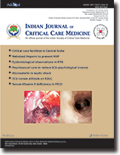
Indian Journal of Critical Care Medicine
Elevating Standards in Intensive Care MedicineIndian Journal of Critical Care Medicine is a premier platform dedicated to advancing knowledge in the vital fields of Critical Care and Intensive Care Medicine. Published by JAYPEE BROTHERS MEDICAL PUBLISHERS PVT LTD, this journal has been a crucial resource since its inception in 2004, and it continues to play a significant role in disseminating groundbreaking research and clinical practices. With an impressive Scopus rank of #42 out of 110 and a 62nd percentile in its category, the journal is recognized for its quality and relevance within the medical community, achieving a Q2 category ranking in Critical Care and Intensive Care Medicine for the year 2023. Although not open-access, it provides essential insights tailored for researchers, healthcare professionals, and students alike, focusing on emerging trends, innovative techniques, and comprehensive reviews that enrich the discourse in critical care. By bridging gaps in knowledge and practice, the Indian Journal of Critical Care Medicine serves as an indispensable resource for those committed to improving patient outcomes in the ever-evolving landscape of critical care.
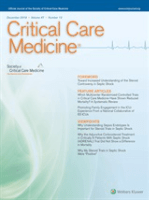
CRITICAL CARE MEDICINE
Transforming Critical Care Through Innovative ResearchCRITICAL CARE MEDICINE is a premier journal dedicated to the advancement of knowledge and practice in the field of critical care and intensive care medicine. Published by Lippincott Williams & Wilkins, this distinguished journal has been at the forefront of medical research since its inception in 1973, and it continues to offer insights into the latest developments and innovations in critical care. With a remarkable ranking of #5 out of 110 in Scopus' Critical Care category and a 95th percentile rating, CRITICAL CARE MEDICINE is a leading source for high-impact research, reviews, and clinical studies. The journal is recognized as a Q1 publication, underscoring its authoritative presence within the academic community. Researchers and clinicians are encouraged to engage with cutting-edge findings that aim to improve patient care and outcomes. Although the journal is not open access, it remains an essential resource for professionals seeking to enhance their understanding and application of critical care practices.
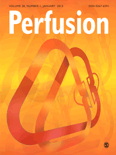
PERFUSION-UK
Elevating Standards in Nursing and Medical SpecialtiesPERFUSION-UK is a distinguished academic journal published by SAGE Publications Ltd, focusing on advanced topics in the fields of nursing, cardiology, and radiology, among others. With an ISSN of 0267-6591 and an E-ISSN of 1477-111X, this journal serves as a crucial platform for disseminating vital research and innovative practices in both theoretical and applied aspects of perfusion science. Operating from the United Kingdom, it has an impressive history, converging years from 1986 to 2024. In the 2023 category quartiles, it has secured a Q2 ranking in Advanced and Specialized Nursing, revealing its strong reputation in the nursing community, while also ranking Q3 in cardiology and other medical specialties, which highlights its multidisciplinary significance. With a commendable Scopus ranking positioning it favorably among its peers, PERFUSION-UK is committed to providing researchers, professionals, and students access to cutting-edge studies and practices, ultimately aiming to enhance patient care and safety in clinical settings.
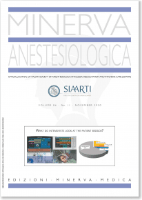
Minerva Anestesiologica
Shaping the Future of Pain Management Through Scholarly InsightMinerva Anestesiologica, published by EDIZIONI MINERVA MEDICA, is a premier journal in the field of anesthesiology and pain medicine, with a commendable impact factor and classified in the second quartile (Q2) for 2023. Since its inception in 1953, this esteemed journal has served as a vital resource for researchers, clinicians, and students, presenting high-quality peer-reviewed articles that address a wide range of topics within the domain of anesthesiology. With its current ranking of #42 out of 136 in the Scopus database, Minerva Anestesiologica is recognized for its contribution to advancing clinical practices and innovations in pain management, furthering the knowledge base and professional development in anesthesiology. Although the journal is not open access, it provides comprehensive accessibility options for institutions and individual practitioners, ensuring that critical research is disseminated widely. As it continues to thrive, Minerva Anestesiologica remains a cornerstone of knowledge and a platform for transformative dialogue in the evolving landscape of anesthetic care.
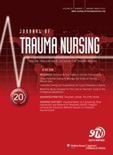
Journal of Trauma Nursing
Enhancing Patient Outcomes with Evidence-Based PracticesJournal of Trauma Nursing, published by LIPPINCOTT WILLIAMS & WILKINS, is a pivotal resource in the fields of trauma, critical care, and emergency nursing. With an ISSN of 1078-7496 and an E-ISSN of 1932-3883, this journal has been at the forefront of disseminating cutting-edge research and innovative practices since its inception in 1995, continuing through 2024. Positioned within the Q3 quartile of the Advanced and Specialized Nursing, Critical Care Nursing, and Emergency Nursing categories, it provides valuable insights into trauma care that enhance clinical practice and patient outcomes. The journal is recognized for its commitment to advancing knowledge and improving the quality of nursing care, making it an essential publication for researchers, practitioners, and students who are dedicated to the fields of trauma and emergency nursing. While currently not available as Open Access, it remains a reputable source of peer-reviewed content aimed at fostering a comprehensive understanding of trauma nursing. Located in the United States at TWO COMMERCE SQ, 2001 MARKET ST, PHILADELPHIA, PA 19103, the Journal of Trauma Nursing continues to impact the profession significantly.
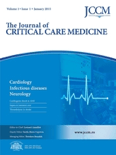
Journal of Critical Care Medicine
Fostering global dialogue in critical care practices.The Journal of Critical Care Medicine, published by SCIENTO, is a pioneering open-access journal dedicated to advancing the field of critical care, emergency medicine, anesthesiology, and pulmonary medicine. Since its inception in 2015, this journal has made significant strides in fostering knowledge dissemination and scholarly communication within the medical community. With an ISSN of 2393-1809 and an E-ISSN of 2393-1817, it provides a platform for high-quality research that impacts clinical practices and improves patient outcomes. Currently ranked in the second and third quartiles across multiple categories such as Critical Care and Intensive Care Medicine, and Emergency Medicine, the journal’s impact is underlined by its inclusion in prestigious databases like Scopus. The journal’s commitment to open-access publishing ensures that vital research is accessible to a wider audience, enriching the global dialogue in critical care practices. Researchers, healthcare professionals, and students seeking to remain at the forefront of this rapidly evolving field will find an invaluable resource in the Journal of Critical Care Medicine.
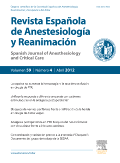
Revista Espanola de Anestesiologia y Reanimacion
Empowering professionals with cutting-edge insights.Revista Española de Anestesiología y Reanimación, an esteemed journal published by Elsevier, serves as a pivotal resource at the intersection of anesthesiology, critical care, and pain medicine. Established in 1963, this journal has continually contributed to the evolving dialogue in these fields, showcasing innovative research that informs practice and enhances patient care. With a current Q3 ranking in both anesthesiology and critical care disciplines as of 2023, it represents a vital platform for clinicians and researchers alike, who are committed to advancing knowledge and improving clinical outcomes. Though not an open-access publication, Revista Española de Anestesiología y Reanimación ensures rigorous peer-review processes and offers insights from leading experts around the globe, making it an invaluable reference for professionals seeking to stay abreast of the latest advancements and trends. Its bibliometric indicators and Scopus rankings affirm its relevance and influence within the academic community, solidifying its role as a cornerstone of anesthesiology and intensive care research.
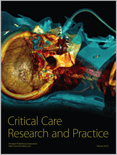
Critical Care Research and Practice
Elevating patient care with evidence-based insights and advancements.Critical Care Research and Practice is a distinguished open-access journal published by HINDAWI LTD that has been at the forefront of disseminating vital research in the fields of critical care and intensive care medicine since its inception in 2010. With an impressive Q2 ranking in its category and positioned in the top 63rd percentile according to Scopus rankings, the journal serves as a critical platform for researchers, practitioners, and students aiming to advance their understanding and improve outcomes in intensive care settings. Based in Egypt, the journal's breadth encompasses diverse aspects of critical care, including innovations in treatment protocols, evidence-based practices, and the latest advancements in patient care strategies. Through its commitment to open access, Critical Care Research and Practice ensures that high-quality research is readily available to a global audience, fostering collaboration and knowledge sharing across the medical community.
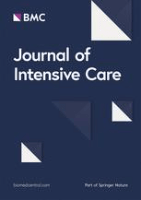
Journal of Intensive Care
Bridging Research and Practice in Intensive Care MedicineThe Journal of Intensive Care, published by BMC, is a leading open access journal dedicated to advancing research and knowledge in the fields of critical care and intensive care medicine. With an impressive 2023 rank of #11 out of 110 in its category and placing in the 90th percentile, this journal offers a vital platform for researchers, clinicians, and healthcare professionals to disseminate innovative findings and best practices. Launched in 2013, the journal has gained significant recognition, achieving a Q1 quartile ranking in critical care, reflecting its commitment to high-quality contributions that address pressing issues in patient management and care. Additionally, as an open access publication, the journal ensures that its content is widely accessible, fostering collaboration and knowledge sharing within the global medical community. For those engaged in intensive care, the Journal of Intensive Care is an essential resource for staying abreast of the latest research trends and clinical advancements.
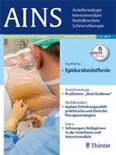
ANASTHESIOLOGIE INTENSIVMEDIZIN NOTFALLMEDIZIN SCHMERZTHERAPIE
Empowering Clinicians with Cutting-Edge ResearchANASTHESIOLOGIE INTENSIVMEDIZIN NOTFALLMEDIZIN SCHMERZTHERAPIE, published by GEORG THIEME VERLAG KG in Germany, serves as an essential resource for professionals in the fields of anesthesiology, intensive care, emergency medicine, and pain management. This esteemed journal, with the ISSN 0939-2661 and E-ISSN 1439-1074, has been a critical platform for scholarly exchange since 1980, advancing knowledge and practice in these vital areas of medicine. Although currently positioned in the Q4 category across several medical disciplines, its commitment to disseminating innovative research and case studies ensures that it remains relevant in the ever-evolving landscape of medical science. Although the journal does not offer open access, it provides comprehensive insights and findings that cater directly to the interests of researchers, clinicians, and students eager to enhance their expertise and stay abreast of contemporary practices. The journal continues to foster dialogue and development within its community, making a significant contribution to the understanding and improvement of patient care and clinical outcomes.